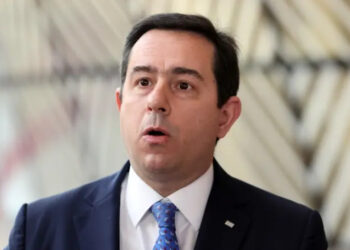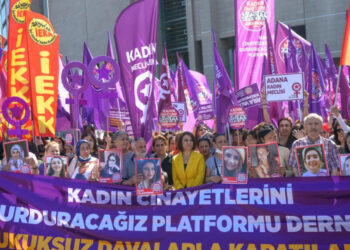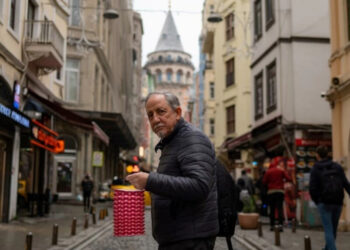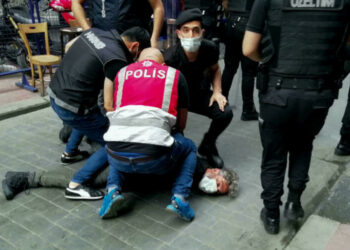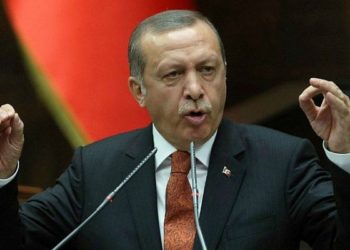Shortly after Sera Kadigil, a Turkish opposition party official, called on her fellow citizens to reject a presidential scheme proposed by the government in a viral video on the social media, she was taken into custody. She was charged over a tweet she posted 7 years ago.
In Duzce, a town close to the capital, two men posed with their guns and posted on Facebook with a chilling message: “In the streets, we will be waiting naysayers in the referendum.” After a flood of complaints, the men were briefly detained and let go.
Kadigil’s “no” video was in response to a campaign, akin to ALS water-bucket challenge that went viral few years ago, launched by pro-government celebrities in a show that turned into a contest of who is more loyal to the country’s president, Recep Tayyip Erdogan. The “yes” campaign spun out of control to the extent that even Prime Minister Binali Yildirim said “enough.”
Kadigil was released after critics protested loudly. But not everyone is as lucky as her. And not everyone is as brave as her in publicly campaigning for a “no.” People in Turkey, weary of election after election in the past 3 years, are headed into a referendum in a climate that few say are free. At least 149 media outlets were shut down in the past six months, and for one count, 192 journalists are sitting in prisons. Many cities repeatedly banned public events such as protests and picketing, including capital Ankara.
 With Kadigil’s detention, the message could not be more clear. CHP lawmaker Baris Yarkadas told media that if someone is arrested over tweets posted in 2010, then the entire government members should have been placed behind bars. The paramount motivation, he argued, was to intimidate opponents and defenders of ‘No’ vote ahead of the referendum.
With Kadigil’s detention, the message could not be more clear. CHP lawmaker Baris Yarkadas told media that if someone is arrested over tweets posted in 2010, then the entire government members should have been placed behind bars. The paramount motivation, he argued, was to intimidate opponents and defenders of ‘No’ vote ahead of the referendum.
As the government and President Erdogan, the politician whose lifelong bid and political future is at stake with the upcoming referendum, have mobilized unrivaled sources at their disposal for the ‘Yes’ campaign, opponents of the constitutional bill will not be able to do the same for a ‘No’ vote. Worse, those who openly campaign for the ‘No’ vote indeed face tremendous risks and, as in the case of Kadigil, even detention.
No Free Public Debate
The opposition is extremely worried about the lack of free public debate about the referendum. Recently, a number of lawmakers from pro-Kurdish People’s Democracy Party (HDP) have been arrested over terrorism-related charges. For legal experts, Turkey’s vague counter-terrorism laws enable the government to execute political operations through subtle legal methods. Spokesman of the party, Ayhan Bilgen, one of the most prolific critics of the presidential bill, was jailed last week. The post-coup crackdown on opponents, mass arrests and purges cast doubt on a healthy referendum during the emergency rule.
To the critics, the toxic atmosphere of fear under the state of emergency does not provide ideal conditions for a free, fair and transparent vote, let alone a campaign free of government pressure. Still, immediately after Parliament voted to pass the bill, which envisions a stronger executive presidency in a framework that breaks down clearly demarcated lines between powers, people and journalists from all corners of life poured into social media to make a compelling case for either ‘Yes’ or ‘No’ vote.
Despite for all challenges and risks, opponents reflect their views on videos and share their thoughts on all available alternative media platforms, mostly on the social media, given that mainstream media is no longer able to follow a path independent of the government’s vicious control. Kadigil says her video got nearly 4 million views online, a factor which she thinks was the chief cause for her detention. Major celebrities, famous sports athletes, including Turkey’s international star Arda Turan who currently plays for Spanish heavyweight FC Barcelona, and singers took part in campaigns that already started before an official kickoff on Feb. 7.
Campaign Kicks Off
Though bound by constitutional provision for not taking part in any campaign for a political party, Mr. Erdogan launched his campaign in Mediterranean province of Mersin on Friday to further the cause of ruling Justice and Development Party (AKP). Similarly, the president previously disregarded the constitutional law with temerity during June 7 and Nov. 1 parliamentary elections in 2015 to marshal his broad support base to boost the standing of the ruling party. While his overbearing presence backfired in the first one, centering on the presidential theme during the campaign period, the second election saw a more cautious president who avoided alienating voters by freezing his presidential push for a while.
“We will make the age for candidacy 18. We will increase the number of deputies to 600 [from 550]. Are we ready?” President Erdogan asked the crowd gathered for the inauguration of Mersin City Hospital.
For those who are predisposed to vote ‘Yes’ to an executive presidency, which places all powers in one man’s hands, removing safeguards of checks and balances, the political battle not only revolves around the larger-than-life persona of Mr. Erdogan but also about the identity of Turkey and its future direction. Infused with highly nationalist sentiments, pro-Yes campaign underlines a stronger Turkey under Mr. Erdogan’s leadership.
Ridvan Dilmen, one of the most famous soccer commentators on TV took a selfie video in which he expressed support, extolling wisdom of a presidency in a speech that sparked public backlash. “Our homeland, our country is passing through a very tough period. A veritable war of independence. We want a strong Turkey. For a strong Turkey, yes I am in,” Reuters quoted Ridvan Dilmen as saying.
Turan soon joined him, opening splits in Turkey’s divided soccer world. Former Fenerbahce player and Konyaspor coach Aykut Kocaman, warned football figures against involvement in partisan politics that could sow divisions among fans and members of the football community. He has called for a bi-partisan and apolitical stance.
Clash of interests and identities loom large over the impending vote as religious group leaders and civil society representatives also join the debate to blaze out referendum wilderness. Even mafia boss Sedat Peker, a fearsome incendiary figure who ascribes to a fringe ultra-nationalist, anti-globalist credo and who proudly declares fealty to Mr. Erdogan, tried to offer an uplifting vision for why ‘Yes’ vote would elevate Turkey into a respected status. He said he will be for ‘Yes’ and will be in streets if some people try to block the vote. His pledge is interpreted by national media as a veiled threat to opponents of the bill. Mr. Peker served 10 years in prison as a crime lord. 3 years ago, the government-sponsored law secured his release from the prison.
Devlet Bahceli, nationalist MHP leader, is another person to be thankful for Mr. Erdogan for containing an insurgent group taking over the party’s leadership last year. The MHP emerged as the kingmaker that could decide the fate of the vote. Once a formidable opponent of the executive presidency, Mr. Bahceli abandoned his decade-long opposition and embraced Mr. Erdogan’s vision of all-powerful presidency in a new political re-alignment.
Polls are divided over MHP base. Pro-government polling companies show the majority of MHP voters favor constitutional reform while several other firms, including SONAR, forecast that most of MHP nationalists vote ‘No’ to proposed changes. A new poll conducted by Gezici polling company finds that more than 58 percent of all citizens vote ‘No’ in a referendum, an indication that would alarm Mr. Erdogan who invented a lot in his latest referendum gamble.
It is an existential referendum for Mr. Erdogan. His supporters wage a campaign that borders on religious submission. A recent cartoon depicted the Satan saying “No” to God, an attempt to draw parallels between naysayers and the Satan.
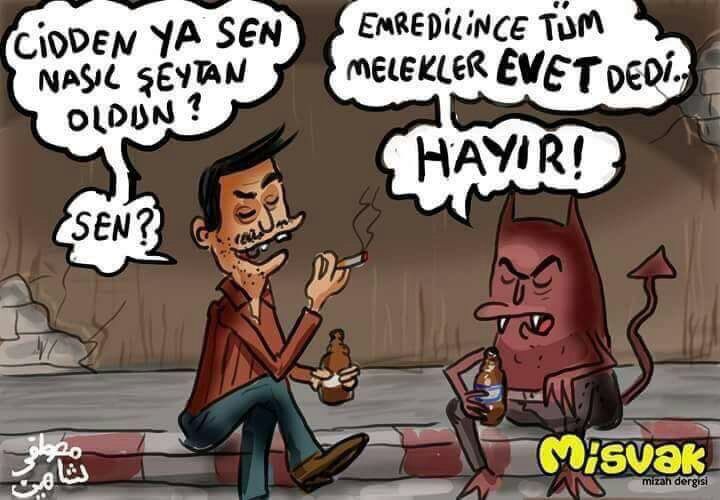
The new constitutional bill enables Mr. Erdogan to appoint vice presidents and cabinet members, senior officials of top bureaucratic institutions, university rectors, intelligence chief. He will also be able to dissolve Parliament.
One of the most controversial aspects of the new framework is that the president will retain the position of a party chairman, which means he will be both head of the state and a political party in Parliament.
According to constitutional experts, including former Supreme Court Chief Justice Sami Selcuk, this amounts to the elimination of separation of powers, equating executive and legislative branches if the president’s party enjoys the majority in Parliament. Mr. Selcuk describes proposed system as a constitutional dictatorship in which a president enjoys powers of a dictator on a permanent basis in line with constitutional law.




